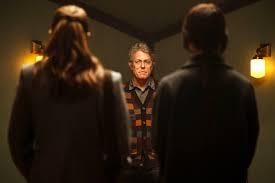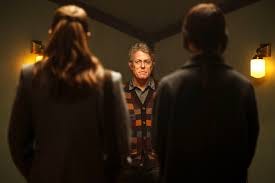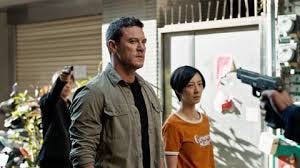Based on the beloved 1972 children’s book of the same name by Barbara Robinson, The Best Christmas Pageant Ever begins with the small town of Emmanuel beginning preparations for their 75th annual church Christmas pageant, a tradition that is beloved by many even though some, such as 10-year-old Beth (Molly Belle Wright), rue the fact that it has grown too formulaic over the years because it never changes. That proves not to be the case this year when the regular director breaks her legs and Beth’s mother, Grace (Judy Greer), ends up being put in charge on the assumption that she will just follow the same game plan used in previous years, such as having the same snotty girl play the Virgin Mary for the fourth straight year. If that weren’t enough, things take another turn when the five Herdman children—the terrifying siblings who live on the outskirts of town and who do all the things that bad kids did in children’s literature circa the early 70s—not only turn up unexpectedly turn up at church one day (having heard that there were snacks) but wind up intimidating the other kids so that they wind up with all the key roles in the pageant. Naturally, most everyone else wants Grace to give them the boot but she puts her faith in them and as the newcomers begin to learn about (and question) the Nativity story for the first time, they inadvertently cause everyone to really examine it and ponder its true meaning instead of merely paying lip service to it.
Although I enjoyed the book when I read it as a wee lad, I have to admit that I had some hesitations about seeing it make its big-screen debut (there was a condensed TV adaptation in 1983 that is notable for marking the acting debut of Fairuza Balk and practically nothing else) due to it being directed by Dallas Jenkins, a big name in the world of Christian entertainment who is behind the TV series The Chosen and who has also directed a film featuring Kevin Sorbo in the lead—I feared that the resulting film might end up turning into the kind of bland, formulaic product that the very people condemning Grace in the story would look at with approval. While the film does lay things on a little thick at times—there is an especially clumsy bit towards the end where images of the pageant are intercut with flashback to the actual Nativity in an awkward attempt to underline how the Herdman brood have brought the story back to its origins—it mostly succeeds at replicating the book’s combination of tart humor with a gentle underlying message of faith, tolerance and trying to see the good in even the seemingly worst in people. I also appreciated the decision to follow in the footsteps of last year’s wonderful kidlit adaptation Are You There God? It’s Me, Margaret by making it a period piece instead of clumsily trying to update the material. Although The Best Christmas Pageant Ever is not quite as wonderful in its celluloid incarnation as it was on the page, it still makes for a reasonably amusing and occasionally thought-provoking holiday entertainment for younger and older family members alike
.By coincidence, another film dealing with notions of spiritual inquiry is opening this weekend in addition to The Best Christmas Pageant Ever but I can assure that the comparisons between that film and Heretic begin and end there. Two young Mormon missionaries, the idealistic Sister Paxton (Chloe East) and the more worldly Sister Barnes (Sophie Thatcher) are out spreading the word of God when they come upon the rural home of Mr. Reed (Hugh Grant), who is eager to invite them in to hear what they have to say, assuring them that his shy wife will be joining them when she is done cooking that wonderful-smelling blueberry pie. Once they begin talking, however, Mr. Reed’s initially benign nature begins to recede a bit as he begins grilling them with increasingly invasive questions while pointing out the hypocrisies of not just Mormonism but of all religions. When the two try to leave, however, they only then realize that they have found themselves in a trap and that the only hope that they have of escaping Reed and his bizarre home is to figure out how to use their own degrees of faith in order to help them match the intellectual games being played by their captor.
Although the setup up for the film may make it sound like a loopy theological riff on the Saw franchise, this work from the writer-director duo of Scott Beck and Bryan Woods proves to be a lot smarter and more engaging that it sounds. While the film may at first seem like a kind of cheeky revenge fantasy for anyone who has been forced to listen to others go on at self-assured length about how their variation of God is the only true one, the film establishes itself early on as being more sympathetic to the unwitting victims and as their predicament grows, the screenplay allows them to come across as smart and resourceful as opposed to letting them be the typical horror film victims who blunder into one bad decision after another. As the cheerfully malevolent Mr. Reed, Grant knows that he has the type of role that he can really tear into, now that he has shifted from playing affable romantic leads to less savory characters, and he is clearly having a lot of fun as he delivers one of the most entertaining performances of his career. That is to be expected, I suppose, but co-stars East and Thatcher (especially the latter) are just as strong, sure and confident as they try to puzzle their way out of their predicament. Of course, more religiously devout viewers (especially Mormons) are probably not going to like it right from the get-go while more secular audiences may find the final scenes a bit disappointing in comparison to what came before them. That said, Heretic is the kind of rare provocative thriller that leave you with much to talk about once it has ended, possibly over a nice slice of pie
.As the new action-comedy Weekend at Taipei opens, DEA agent John Lawlor (Luke Evans) has just been put on leave after a major drug bust goes sideways and leaves him without a definitive connection to his main target, Taiwan-based mob boss Kwang (Sung Kang), who is himself in the early stages of a trial back home. As he has been in contact with a mysterious figure who promises they have information that will bring Kwang down for good, Lawlor jets off to Taipei in order to collect the material from the unknown figure who proves to be Raymond (Wyatt Yang), Kwang’s teenage stepson whose evidence is a ledger containing proof that the seafood concern Kwang uses as a front is responsible for the deaths of thousands of dolphins per year. When Kwang learns of this betrayal, Raymond and his mom, Joey (Lun-Mei Gwen), go on the run and eventually cross paths with Lawlor, which leads to some uncomfortable conversations when Joey reveals that Raymond is actually Lawlor’s son, the product of a brief affair between the two when he was working undercover that ended when he had to leave abruptly. Following this, the remainder of the film is essentially an extended series of chase and fight scenes briefly interrupted by bits in which Lawlor gets to know the son he never had and become reacquainted with the woman that he at least once clearly had.
The film is the latest issue from the virtual filmmaking factory that is French auteur Luc Besson, who produced and co-wrote the screenplay with director George Huang. As I have mentioned from time to time, I am an enormous fan of Besson and his stylishly made and unabashedly crackpot action spectacles but even I have to concede that this one is a bit of a dud. The screenplay is little more than a tired rehash of themes and ideas that he has deployed many times in the past and assembled here in such a formulaic manner that it feels more like an adaptation of a particularly weak Mad Lib than a convincing narrative. The story is flat, the characters are beyond nondescript and the action beats, while competently executed, lack the delirious visual style and crackerjack editing found in his best work. The only scene that works is one in the early going involving Joey that turns into an extended homage to, of all things, Breakfast at Tiffany’s (including the use of “Moon River” on the soundtrack)—the scene is quirky and unexpected in the way that Besson can be at his best but it proves to be the lone fleeting moment of interest before plunging into 90-odd minutes of extended tedium. Conveying all the excitement of a DTV sequel to a film that you didn’t especially care for in the first place, Weekend in Taipei offers viewers tedium rather than excitement and the best thing about it is that it is so utterly forgettable that it won’t exactly linger in your mind for too long if you are foolish enough to take a look at it.






